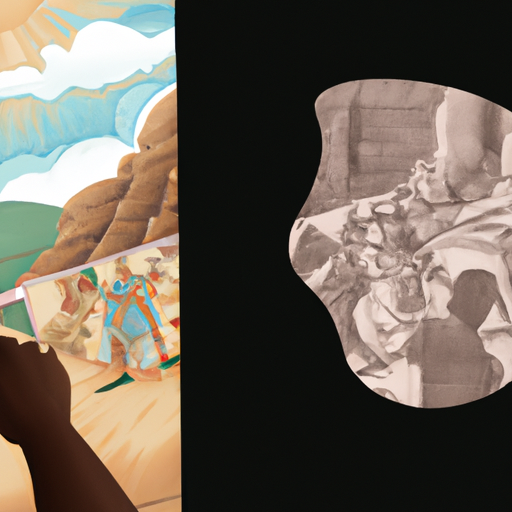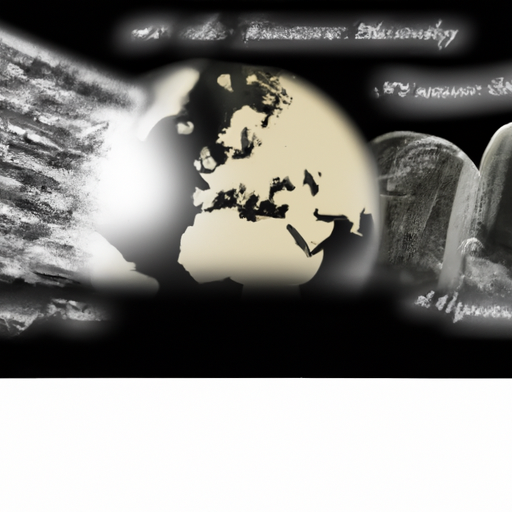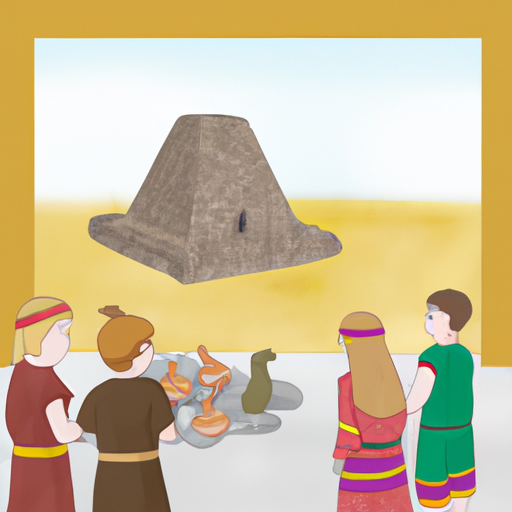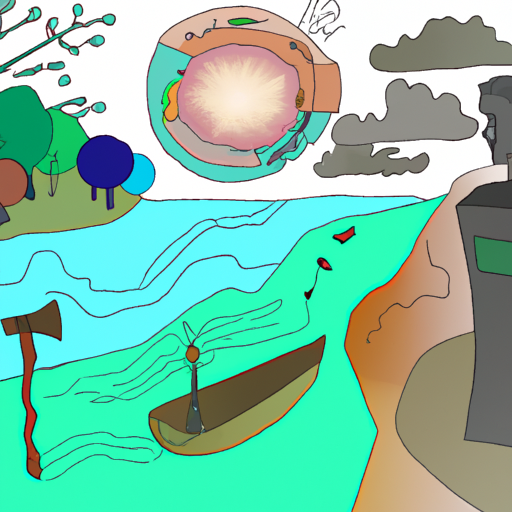History of Mesopotamia: Famous People, Places and Events
Delve into the depths of time and discover the storied past of Mesopotamia, a culture renowned for its groundbreaking advances in both artistry and technology! From its earliest days to its eventual decline, this ancient civilization has left a lasting imprint on the world that continues to be felt today. Uncover the mysteries of this remarkable society, and gain insight into how it shaped our modern world.

A story that has been told for eons, a journey through the ages that has left an unforgettable imprint on our world. A civilization of the past that was one of the first to create writing, art and technology – a true pioneer in its day. From its emergence to its decline, Mesopotamian culture has left an eternal legacy which continues to be felt in our lives today.
The Sumerians were amongst the earliest people to form cities and establish governed societies. They also developed their own written language and had a vibrant cultural life which included literature and music. Subsequently, the Akkadians, Babylonians, Assyrians and Chaldeans all made their own contributions to Mesopotamia’s culture.
Not only did this ancient civilization bring about political advances but it also achieved success in science and mathematics too; inventing methods for calculating time and astronomy as well as establishing laws concerning commerce, marriage and more. Furthermore, they constructed impressive ziggurats out of mud bricks which have withstood the test of time for centuries!
It may have been two millennia since this great civilization perished yet its effects are still present in numerous aspects of our lives – from language to law – many things we take for granted are rooted in Mesopotamian history. So next time you use a calculator or write a letter – remember this remarkable culture which changed human history forever!
.
Introduction

Mesopotamia, an ancient region located in the Middle East, is renowned for its majestic past. This area was home to some of the world’s earliest civilizations, including the Sumerians, Babylonians, Assyrians and Persians. It has been said that this area has given rise to many facets of art, literature, science and mathematics. In addition, it is known to have been the birthplace of the world’s first cities and law codes. Remarkably too, it is credited with introducing such advances as cuneiform writing and the wheel! Even today Mesopotamia’s legacy of cultural accomplishments still reverberates throughout society.
– Historical Significance of Mesopotamia in Ancient History
A region of the Middle East, Mesopotamia has held a place in history for millennia. Home to some of the world’s earliest civilizations, it has had a lasting influence on human development. With its contributions to writing, law, agriculture, and other aspects of society, Mesopotamia has come to be known as the “cradle of civilization.”
The Sumerians were among the first to settle in this area around 4500 BCE and established city-states with their own laws and governments. This allowed them to expand their trade networks and make advances in mathematics, astronomy, art, and literature. Moreover, they developed cuneiform writing which was used to record laws and keep records of business transactions.
In 2000 BCE came the Babylonians who built one of the most impressive cities of ancient times with walls and towers that still stand today. King Hammurabi created a code of laws that provided justice for all citizens regardless of social class or gender; this code would shape legal systems for centuries afterwards.
Mesopotamian culture also left its mark on religion; gods such as Ishtar, Marduk, Enlil, and Ashur were worshipped by both Sumerians and Babylonians alike throughout history. These gods provided structure for religious rituals which impacted many other cultures including those from Egypt and Greece who adopted similar practices over time.
The legacy of Mesopotamia is undeniable; it was an essential hub for innovation during ancient times that shaped our modern world today through its contributions to law, writing, agriculture, art, literature, religion mathematics and more – even thousands of years later many aspects from this period are still relevant today making it an integral part of human history.
– The Ancient Civilizations of Mesopotamia
Perplexed by the distant past, a region of the Middle East stands out in history. A place where civilization first bloomed, it has been studied for centuries. Its ancient civilizations, from Sumer to Akkadian, Assyrian to Babylonian, left behind artifacts that have shaped our world today. From mathematics and astronomy to literature and law – these cultures have had a long-lasting influence on our understanding of life. Uncovering secrets from the 4th millennium BC, this ancient land is an integral part of humanity’s past.
– Famous Artifacts from Mesopotamia
A region of the Middle East with a deep and storied past, Mesopotamia has produced many iconic artifacts that have come to signify its ancient culture. From clay tablets to cylinder seals, these objects provide us with a look into what life was like thousands of years ago. Here are some of the most renowned relics from this region:
1. The Code of Hammurabi, an early set of written laws from around 1750 BCE containing 282 regulations on matters such as property rights and criminal justice, is one of the oldest known documents of its kind.
2. Cylinder seals were small objects used to authenticate documents and transactions by rolling them onto wet clay tablets; they often featured intricate designs with gods, animals, or scenes from mythology or everyday life.
3. Clay tablets were used for writing in Mesopotamia as early as 3000 BCE; inscribed with cuneiform script, they were replaced by alphabetic scripts around 500 BCE.
4. The Ishtar Gate was one of the main gateways into Babylon during Nebuchadnezzar II’s reign (604-562 BCE). It boasted blue glazed tiles depicting gods and goddesses from Babylonian mythology alongside dragons and bulls symbolizing strength and power.
These artifacts offer us an unprecedented glimpse into the history of Mesopotamia and give us an invaluable insight into its culture and beliefs.
– Major Historical Events in Mesopotamian History
Throughout the ages, Mesopotamia has been at the epicenter of momentous events that have shaped our world. From its earliest days, when the Sumerians established their civilization in 3500 BC, to its fall under Mongol forces in 1258 AD and its later occupation by Britain during World War I, this region has seen a plethora of significant changes.
The Sumerian Renaissance saw advances in writing, mathematics, and other sciences as well as the development of an irrigation system for large-scale agriculture. This period was followed by Sargon of Akkad’s rule over all of Mesopotamia which established the Akkadian Empire from 2300 BC until 2100 BC when it was conquered by the Gutians from what is now Iran.
In 1800 BC Babylon rose to prominence under King Hammurabi who created a set of laws known as Hammurabi’s Code which regulated commerce and provided justice to all citizens regardless of social class or gender. Then in 539 BC Babylon fell to Cyrus II of Persia and became part of the Persian Empire bringing political stability and economic prosperity as well as increased trade with other parts of Asia Minor and Egypt.
Alexander the Great conquered Mesopotamia in 332 BC on his march towards India and following his death his generals divided up his empire into different kingdoms including Seleucid Syria (which included much of modern-day Iraq). Islamic forces took over much of Mesopotamia in 637 AD forming part of the Umayyad Caliphate until it was sacked by Mongol forces in 1258 AD leading to a period of instability for much of Iraq until Ottoman rule began in 1534 AD.
After World War I ended Britain occupied Iraq until 1932 when it gained independence as a monarchy under King Faisal I only for republican rule to be instated through a coup in 1958 until Saddam Hussein rose to power through a series of bloody purges against his opponents in 1979 before being overthrown during Operation Iraqi Freedom.
– Contributions of Mesopotamia to World History
A region of Southwest Asia situated between two renowned rivers, the Tigris and Euphrates, Mesopotamia is a place of great consequence to world history. It has been credited with making remarkable contributions to how humanity understands and interacts with the world today. As early as 3000 BC, cuneiform, the oldest form of writing known to man, was first used in this part of the world, ushering in a new era of communication and commerce. Furthermore, it was also here that one of the earliest legal systems was developed; it included regulations for marriage and property rights which provided a structure for social order that would be adopted by others throughout time.
Mesopotamian society is also celebrated for its advances in mathematics, astronomy and engineering. The Babylonians invented multiplication tables and geometric formulas still employed today; they also created an astronomical calendar based on observations of stars and planets in the night sky. Moreover, Mesopotamian engineers devised irrigation systems enabling them to cultivate crops in arid climates – a development that ultimately led to increased food production and population growth around the globe.
In sum, Mesopotamia’s influence on world history has been immeasurable; from our language to our laws, its legacy remains deeply embedded in human existence.
conclusion

Awe-inspiring, enigmatic, and timeless – the ancient realm of Mesopotamia has captivated minds for millennia. An almost mythical land of antiquity, its roots stretch far back in time to around 4,000 BCE. Home to some of the earliest known cities, writing systems, and legal codes, this mysterious cradle of civilization has had an indelible influence on modern society that continues to be felt today.
.
Some questions with answers
1. What is Mesopotamia most famous for?
Mesopotamia is most famous for its ancient history and contributions to the development of early civilizations.
2. What impact did Mesopotamia have on history?
Mesopotamia was one of the earliest civilizations and had a huge impact on the development of many aspects of our modern world, including writing, mathematics, law, art, architecture, and religion.
3. Where is Mesopotamia located?
Mesopotamia is located in the Middle East, between the Tigris and Euphrates rivers in what is now Iraq and parts of Syria, Turkey, and Iran.
4. When did Mesopotamian civilization begin?
The earliest recorded settlements in Mesopotamia date back to approximately 5000 BCE.
5. Who were some of the major civilizations that arose in Mesopotamia?
Some of the major civilizations that rose in Mesopotamia include Sumerian, Akkadian, Babylonian, Assyrian, and Neo-Babylonian empires.





